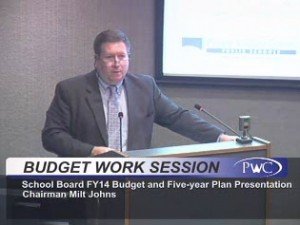
Board of County Supervisors members were not convinced altering their 56.5 percent revenue sharing agreement with the School Division was the best means of providing additional funding at their April 2 work session.
School System Needs
School Board Chairman (At-large) Milton Johns presented to the BOCS based on the school’s needs tables and graphs to highlight how county funding had not kept pace with the average of 2,000 new students enrolling in the school system annually.
These statistics show that over the past five years funding has decreased where student populations have increased.
Average annual growth rate in funding: -0.69%
Average annual growth rate in students: 3.0%
Cuts could be worse if sequestration takes affect. It would slash Title VI-B or special education budgets, along with Title I (economic need) and other required funds. Where these may be defunded by the federal government, it is legally mandated the jurisdictions do not defund these areas.
Complicating matters, choosing to provide additional funding could mean a loss of federal funds once they become available.
The school system is also close to reaching its “debt ceiling” in five years. The debt ceiling is when debt on new construction and improvements reaches beyond 10 percent of the annual budget that allows the county to borrow at a low interest rate.
“Essentially we have a 20-year amortization,” said Johns. He compared it to, “Stacking up mortgages on the schools.”
Once that debt ceiling is reached, it threatens the county’s superior AAA bond rating.
“(Investors) are considering the county and the schools together. The schools don’t issue any separate debt. It’s all county debt. This is a real issue that Chairman Johns is pointing out,” said Deputy County Executive Christopher Martino.
Johns also addressed how class sizes are currently the highest in the state, and it would take $15 million to decrease class sizes by just one student across all grade levels. He explained it requires hiring more teachers and would need to be funded every year.
“It is directly a function of how many teachers are available to a site,” Johns said.
Effects of Altering Revenue Sharing Agreement
A subsequent presentation by Michelle Casciato, Director of the Office of Management and Budget for Prince William County, showed that increasing school division funding at the expense of county funding would involve severe cuts to county agencies and offices.
Supervisor Pete Candland requested a presentation on his proposed 62/38 revenue split. He hoped to use additional school funding to decrease class sizes and salary increases for classroom teachers.
Candland’s plan asked the county to exclude police, fire & rescue, libraries and fields from budget reductions. Casciato also excluded funds required by federal and state mandate.
The resulting county share of the budget was reduced to $92 million. OF that nearly half ($42 million) would have to go towards funding schools, in accordance with Candland's 62/38 plan. This would affect numerous agencies like public works. However, according to Casciato’s chart, the revenue sharing agreement would only be beneficial to schools when there is enough money in the overall budget.
Keeping the advertised tax rate, an average tax bill that is 3.6 percent higher than the average FY13 bill, would provide the school division right around $42 million additional funds throughout the five-year plan.
Should the county adopt a flat tax bill or one percent increase, additional funds would shrink by the end of the five-year plan, and be insufficient to fund even classroom reductions.
This goes to something Supervisor Michael May said: “Fifty-six percent of something is better than 62 percent of nothing.”
Changing the Five-Year Plan and/or Revenue Sharing Agreement
The BOCS also discussed the problems with the five-year plan as it applies to the school system. PWCS plans its budget around the plan, which seems to change every year. Johns called it “five one-year plans.”
However, Johns did not want provide a specific suggestion on how the BOCS should fund school needs, and if it should alter the revenue sharing agreement established in 1998.
“The split is certainly something that could be revisited. The school board isn’t a taxing authority. We don’t control any of our taxing authorities. The school Board is loath to say, ‘you need to raise taxes.’”
However, Johns added, “It would be disingenuous to say we have no responsibility. Obviously revenue comes from taxation. I think the split 56.5 number- maybe it’s not adequate anymore.”
He did say that the people of Prince William pay the lowest tax bill in Northern Virginia and that low taxes is a “double whammy” for schools.
“It makes housing more affordable for families to bring their children to PWC and send them to our school,” Johns said.
BOCS Chairman (At-large) Corey Stewart went on record as being opposed to changing the revenue sharing agreement. He said the schools get more in “lush” years as well. He also approved of how the agreement kept matters cordial between both boards. He said once changed, it would open the agreement to be changed each year.
Development and Increased School Populations
Potomac Supervisor Maureen Caddigan (R) asked Johns if the School Board believes the school system would be better served if the county brought in fewer homes and more commercial employment.
Johns carefully answered that school systems like Arlington that provide the most funding per pupil have a large commercial base from which to draw it.
Average Tax Bill
The advertised tax bill is a 3.6 percent increase over FY13. The tax bill can be lowered at this point, but not increased. Supervisors had said it is necessary not to burden families with heavy tax bills while Northern Virginia may experience the negative results of sequestration on employment and salaries.
Support Bristow Beat - Donate Today!